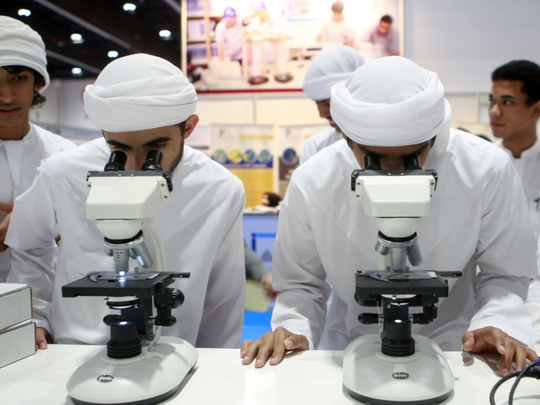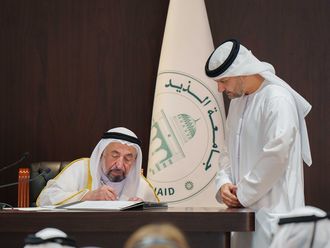
Abu Dhabi: Nearly 80 per cent of Emirati students in public schools across the emirate of Abu Dhabi choose to focus on the humanities at the high school level, even though the majority of new jobs and career opportunities are actually within industries that require an in-depth knowledge of science and technology.
What this means is that these students are opting to study in fields where the supply of jobs is limited, senior educational experts said in the capital today (March 25).
“The UAE is seeing tremendous growth in certain sophisticated new industries, such as aerospace, nuclear energy and semiconductors. To thrive in these new sectors, pupils need to be well-versed in science and technology, but this has not happened yet at the high school level,” said Dr Ala’a Al Deen Ali, division manager for knowledge management at the emirate’s education sector regulator, Abu Dhabi Education Council (Adec).
In a bid to direct students towards scientific and technological fields of study, the authority has launched a reformed curriculum for Grade 11 and 12 students. The reform scraps the choice of the previously available two streams of study, namely, Literary and Science, and presents them with a unified core curriculum.
Under this reform, all students will spend nearly 50 per cent of their time at school, or 21 classes a week out of a total of 45, learning subjects related to the fields of science, technology, engineering and mathematics (STEM). While maths and physics will be compulsory for all, pupils can choose from a host of other subjects, including biology, chemistry and geoscience for two other science electives.
“Maths will be taught during eight classes of 45 minutes each, while physics will be taught four classes a week. For the remaining six STEM classes, pupils will be allowed to split their time equally between two different elective subjects,” Dr Ali told Gulf News.
The reform will apply to all Grade 11 pupils in the 2015-2016 academic year, and will extend to Grade 12 pupils as well in 2016-2017. The language of instruction will continue to be Arabic initially, but this too will change.
“At present, all public school pupils enrolled up to Grade 7 are instructed in English. As they progress to Grades 11 and 12, the language of instruction will be converted to English,” the official explained.
The new initiative does not mean just an added focus on STEM subjects however.
Dr Najwa Al Hosani, curriculum division manager at the Adec, said pupils will also spend three classes a week learning health studies, leadership skills, physical education and jiu-jitsu. These classes will count for 5 per cent of the pupils’ total grade.
“Currently, the importance of these subjects, which are vital to pupils’ well-being and health, is underestimated. This is why the reform sets aside time for these activities and assigns a share of the total grade to them,” Dr Najwa said.
“In addition, we will devote one class to career counselling, advising and test preparation. Through this, children can not only be guided in terms of their career choices but will also be better prepared to sit for international college application tests like the SAT,” she added.
Humanities subjects – Islamic Studies and Integrated Social Studies – will be covered during six weekly classes, while the 14 remaining classes will be shared between Arabic and English language learning.
“Following this reform, we hope to develop pupils who no longer need to spend a foundation year after graduating from high school. Instead, they will be well-equipped to immediately start their university education in fields that are strategically important to the UAE,” Dr Ali said.












